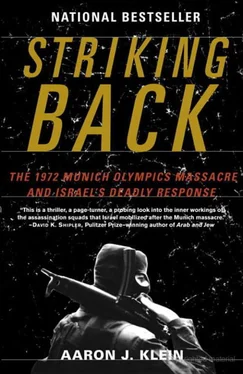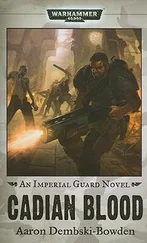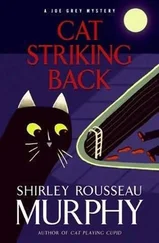Abu-Iyad lived the life of the persecuted—far from his wife and six children, far from their suburban Cairo home, and without a permanent address. When he arrived at Fatah’s offices, it was always without advance notice and accompanied by a posse of armed guards.
In Stateless, Abu-Iyad describes an attempt on his life in August 1973. As he tells it, he was working in the study of his Cairo home when a bodyguard interrupted him. There was a young Palestinian at the door; he insisted on delivering his message to Abu-Iyad personally. “I couldn’t refuse him,” Abu-Iyad writes. “As soon as he entered, he told me he had been sent to kill me, opening his attaché case and pulling out a pistol and a silencer. The young man said he had decided to confess out of fear of arrest or being killed during the assassination. In return, he asked that I keep him safe. He wanted to start a new life in one of the North African Arab countries; if that was impossible, then in one of the Socialist-bloc states. He said he was a Palestinian from the West Bank and his mission to kill me had been given to him by an Israeli security officer whose name he gave. After he had crossed the Jordan River on his way to Amman, where he was supposed to get on a plane, he was stopped by Jordanian police and taken in for questioning. After his mission was discovered, one of King Hussein’s officers, Falah Al-Rifa’i, promised him an extra cash prize if he succeeded in killing me.”
The Palestinian agent, allegedly recruited by the Israelis, was a double agent for the Jordanians. It was not a classic double-cross, rather a unique Middle Eastern phenomenon where a unity of interests in the war against Palestinian terror converged. The Israelis did not really care at whose behest their agent planned on killing Abu-Iyad, or for what additional sum of money.
According to the Palestinian double agent, he had received information about Abu-Iyad’s residence, his Egyptian security detail, and his daily routine. The agent confessed that he was supposed to kill Abu-Iyad two days earlier, at the entrance to the government radio station. Abu-Iyad, the hunted, thanked the young man profusely, but remained circumspect. He took the man’s contact information and said he would be in touch soon.
The plot thickened when the Egyptian Mukhabarat was asked by Abu-Iyad to enter the picture. During a covert search of the man’s room they discovered several suspicious items, including a small, hermetically sealed suitcase that they could not pry open. “Three days later, at 0700, one of the bodyguards wakes me to tell me that the same youth wants to see me immediately. My curiosity was piqued and I agreed to meet him. Immediately when he entered the guest room I noticed that he was carrying the small suitcase that the Egyptian policemen described to me. I demanded that he open the suitcase immediately. He turned pale as plaster, murmuring, and, finally, breaking. He confessed to me that the suitcase held enough explosives to destroy the whole house and to kill my wife and six children. He had been instructed to hide the explosive device under the couch before he left. The first visit and the confession were to gain my trust and get familiar with the place before executing the second and final stage of the operation, as planned by the Israeli and Jordanian security forces. I turned him over to the Egyptian police. Till this day, he sits in a Cairo jail.”
Abu-Iyad claims that twice his children were given boxes of chocolate that were connected to explosive devices. “To our good fortune, my wife and I taught our children to be alert. They are so suspicious that they don’t even open candy packages that I send with somebody to hand-deliver to them when I am abroad.”
The Israelis hunted Abu-Iyad for years to no avail. Abu-Iyad did not travel to Europe, his schedule followed no observable routine, and he kept a cadre of guards around him at all times. After the Palestianian leadership was expelled from Lebanon by the Israelis in 1982, he relocated to Tunis, and remained there, rarely venturing beyond its borders. “We were very close to Abu-Iyad a number of times but we had to stop in our tracks because the risk to the combatants on the ground was too great or we lacked a solid operational scheme,” Colonel (res.) Yossi Daskal, the former head of the Terror Division at Military Intelligence, told me. But for Daskal, a veteran officer, a professional used to making cost-benefit analyses with human lives on the line, the chase may not have been worthwhile. “The hunt for people no longer central to terror rings and operations puts a burden on the collection wings of our intelligence agencies. Many Mossad katsa s spent a lot of time looking for information on these people.”
Abu-Iyad, in stark contrast to his peers, the founding fathers of Fatah, softened his stance on Israel over the years. In February 1974, he was the first to publicly declare the need to establish a Palestinian state on less than the entirety of their homeland, alongside the state of Israel. In August 1988, he was still far ahead of his time in declaring his willingness to accept the state of Israel alongside the Palestinian state that was to come. “If you give me the West Bank and Gaza—I will take it; and if you give me less than that—I will take it too.”
This slide into moderation angered Palestinian extremists. Chief among them was Sabri Al-Bana, aka Abu Nidal, a sadistic zealot. He led a group of loyal followers called the Revolutionary Council of Fatah. The group, which sometimes called itself by the more catchy name “Black June,” assassinated moderate Palestinian officials in Europe and across the Middle East. Abu Nidal claimed it was his duty to save the Palestinian resistance movement from Arafat and his colleagues who had strayed from the path of liberating all of Palestine through armed struggle. Abu Nidal’s organization murdered at least sixteen Palestinians he deemed too moderate. He branched out on occasion. In 1976, under pressure from Iraqi vice president Saddam Hussein, his organization tried to assassinate the president of Syria, Hafez Al-Assad, Saddam Hussein’s bitter rival.
Another deviation took place on June 3, 1982, when Abu Nidal sent men to kill Shlomo Argov, the Israeli ambassador to Britain. That act was used by Prime Minister Begin and his defense minister, Ariel Sharon, as an alleged final straw that demanded an Israeli invasion of Lebanon. The invasion grew into the Lebanon War and devolved into a two-decades-long guerrilla conflict.
Abu Nidal’s cruelty was legendary. Myths and stories circulated through the ranks of Fatah. People claimed the man enjoyed killing. One of his favorite execution techniques was to place a bound victim inside a pit and then pour concrete into the hole, burying the man alive.
One of Abu Nidal’s final missions was the assassination of Abu-Iyad and his close aide Fakhri Al-Omri on January 14, 1991, the day before the first Gulf War commenced. Operation Desert Storm overshadowed the event. On the evening before the war officially commenced Abu-Iyad and Fakhri Al-Omri, a man also thought to be deeply involved in the planning and execution of the Munich attack, had dinner at the Tunis home of Ha’il Abed el-Hamid, aka Abu-el-Hul, a close friend and top operations officer for the Western Wing (charged with carrying out attacks in Israel) of Fatah. Over dinner, they discussed Saddam Hussein’s brutal conduct in Kuwait, Arafat’s support of the Iraqi dictator, and the imminent invasion by the allied force. Everything proceeded smoothly until close to midnight, when Hamza Abu-Zaid, a simple bodyguard, walked into the living room, where the three sat, smoking and drinking. He passed a note to Abu-Iyad and made his way back to the door. Without warning he spun around and opened fire with the automatic weapon in his hand, killing all three men. He tried to escape, but was stopped, jailed, and later executed. Abu-Zaid, a Fatah operative, had been secretly recruited by Abu Nidal’s people and tasked with killing the traitor.
Читать дальше












